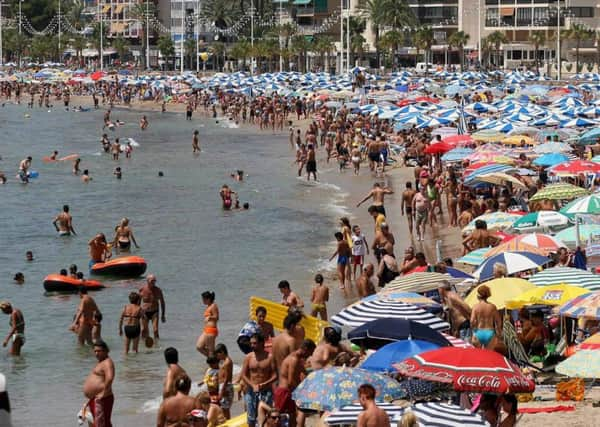Martin Lewis: How to get your currency beach-ready


This article contains affiliate links. We may earn a small commission on items purchased through this article, but that does not affect our editorial judgement.
The overseas holiday collywobbles are real. I recently ran a quick Twitter poll – more than 5,000 responded– that showed 12 per cent of those who intended to go abroad have given those plans up, and a further 35 per cent say they’ll go, but will be more careful with their spending.
As Ally tweeted: “@martinslewis I’m not long back from Australia – things were about 1/3 dearer than a couple of years ago. Painful.”. And with Easter now behind us, my mailbag is creaking with sunseekers asking if they should be buying their foreign currency now ahead of their summer getaways. So let me take you through everything you need to know…
Should I be buying my euros or dollars now for summer?
Advertisement
Hide AdAdvertisement
Hide AdA good question and one I don’t know the answer to. Anyone who tells you they know what’ll happen to currency rates is a liar. It’s a market fluctuating by the minute, rates move both based on economic factors affecting both the pound and the currency you’re buying, and the whims of traders trying to second guess the future interactions of the two.
Of course someone will say “buy now”, someone else will say “wait”, and a third person “the rates will stay the same”. One of them will be right, and will say “I told you so”, but that doesn’t mean they knew.
Personally I don’t bother, I ensure I get the best rates when I go. Yet if you’re nervous, then you can hedge your bets. Buy roughly half what you need now, to lock it in, and then get the best rates when you travel. For the rest of this article I’ll show you the best way to do those.
Take two minutes to get near-perfect rates worldwide, every time you’re away. The easy option is to get and spend on one of the specialist overseas credit card that you religiously pay off IN FULL every month (or you pay up to 20 per cent APR interest – in which case don’t do it).
This gives you the same near-perfect exchange rates the bank gets on the day you spend, in almost every country, time and time again, as unlike most debit and credit cards which add a three per cent “non-sterling exchange fee”, these don’t charge.
There are about eight of these cards, to see which one you’re most likely to be accepted for use my overseas cards eligibility checker at mse.me/travelcardcheck, which shows your acceptance odds for most of them.
If you’ve a decent chance of all of them, a Mastercard tends to give better rates than a Visa. The top two of those are www.halifax.co.uk Clairty, which has long-term good feedback and low ATM withdrawal costs, and newer player www.creation.co.uk Everyday, which has ATM fees that are a smidgeon cheaper.
It’s worth noting that it’s cheaper to spend on these cards than to withdraw cash and spend that; as you may pay interest on cash withdrawals (not spending) even if you fully clear the card. Yet even then they beat most bureaux de change.
Advertisement
Hide AdAdvertisement
Hide AdTop prepaid cards give you today’s top rate, and are easy to get
Prepaid cards have no credit check so anyone can get them. Plus unlike credit cards where you get the rate on the day you spend, with these cards you usually pre-load them with cash before you travel at that day’s rate. So it’s a good way to bag a rate now for spending later. Of course if the pound strengthens by the time you holiday you lose, if it weakens you gain.
My current top picks are www.revolut.com and www.weswap.com/en/ both on rate and the lowest charges. For the analysis and more options see www.mse.me/prepaidtravel.
Need cash? Compare rates from 30–plus bureaux
If you want cash, of course you get the rate on the day you pay. Ignore any flannel like “commission free”, what you want to know is – if I give you £500, how many euros will you give me after all charges? And that’s the way to compare.
You can do this online via my www.travelmoneymax.com site which compares about 30 online bureaux. It also shows you quite how extortionate it is to change money at airports or ferry stations. If you must do that, at least pre-order for pick-up, as you get a better deal.
And beware paying for currency at UK bureaux by credit cards, it counts as a cash withdrawal, so there’s a fee and interest even if you fully repay – so best to pay with a debit card, or cash.
Hiring a car abroad? You’ll need a credit card
Many car hire firms won’t accept a debit or prepaid card when you come to pick up your car. You’ll need a credit card, and remember you’ll usually be paying (or leaving the deposit) in the foreign currency, so a specialist overseas card is particularly good for that.
If they ask, “Do you want to pay in pounds or euros?” – say “euros”
Advertisement
Hide AdAdvertisement
Hide AdWhen paying on a card abroad, you’re often asked if you want the transaction to be in pounds or the local currency. As a general rule, never pay in pounds – that means the overseas store/bank is doing the conversion, and rates are usually awful.
Martin Lewis is the Founder and Chair of MoneySavingExpert.com. To join the 12 million people who get his free Money Tips weekly email, go to www.moneysavingexpert.com/latesttip